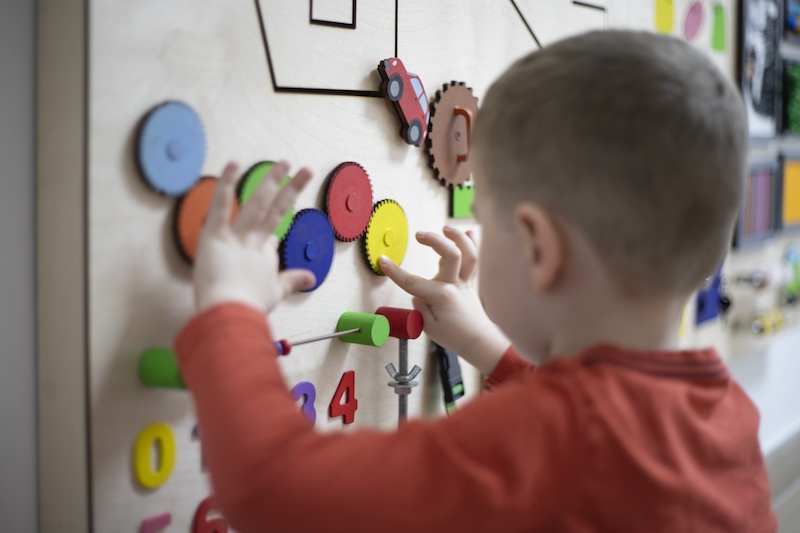Topics

Photo courtesy of Getty Images
“Children don’t come with instruction manuals” – that is what I sometimes say to families when we first get together. Every child is different and develops at a different pace, and your pediatrician can help you assess your child’s development and make sure the appropriate developmental milestones are reached. Therefore, each check-up with your pediatrician should involve detailed developmental surveys and specific additional conversations to make sure your child is “on track.” Besides, valuable resources such as the Centers for Disease Control and Prevention (CDC) and the American Academy of Pediatrics (AAP) have free development tracking tools to inform parents about what to expect. If, at any time, parents or pediatricians have any concerns, these are best addressed without delay.
Autism or Autism Spectrum Disorder (ASD) is one of the conditions that comes up regularly in my discussions with parents when we review their child’s development. Children with autism often reach their motor milestones at the same time as any other baby; that is they sit on time, they crawl and they walk without any issues, but certain delays may be seen in the areas of speech and social development like limited eye contact, not responding to parents’ social interaction/reactions, and having difficulty forming words. If we observe these characteristics together, follow-up is justified. When a diagnosis is not conclusive or when other concerns outside of speech and social development are found, your child’s doctor may refer you to a Developmental Pediatrician. These specialists perform more detailed testing to thoroughly diagnose your child and provide the appropriate treatment or intervention options.
What if my child is diagnosed with autism? First, take a deep breath. You are not alone. Communicate any concerns you have to your child’s doctor. We are trained and experienced to care for children with sensory or developmental challenges, and we are here to help.
What help can I provide to my child? Early intervention is key. The sooner a diagnosis can be made, the more help your child can receive. Below, I list some relevant resources to support you as a parent.
- Early Childhood Intervention (ECI), or other therapy groups are an important part of helping your child’s developmental progress. Your doctor can refer you to these programs while he or she continues to supervise your child’s care.
- ABA (Applied Behavioral Analysis) is a key intervention unique to children with autism. Your doctor will provide a supporting letter/referral for this service.
- School-based enrollment at age 3, through your local public schools, will be able to further assess your child’s developmental needs and offer services in an appropriate classroom setting.
- Autism Speaks and other organizations provide excellent online resources to parents. They often also have local chapters to help you navigate your child’s diagnosis and growth. Remember, siblings of a child with autism may need additional emotional support as well.
- Community resources also exist. It is important to find places that accommodate children with autism. While the current COVID-19 situation may impose some restrictions, there are still many area museums and art programs that offer specific times and appropriate activities to help your child have fun without becoming overwhelmed. Try to involve the whole family in these activities.
Debunking some myths around autism. Parents, rightfully so, have many questions on how to best support their child after a diagnosis. Below, I address the most common question I hear in my office:
- Is there a test to show why my child developed autism? There is no test to provide an unequivocal answer. Autism is considered to be a complex genetic disorder, and it is not clear what role environmental factors play in its development. Sometimes, a pediatrician may refer your child to see a geneticist to investigate further. Other tests, for example, for vitamin levels or minerals, are not helpful.
- Did vaccines cause autism or will they make the condition worse? The answer is no. Vaccines do not cause autism. They allow your child to have a healthy upbringing. Children with autism will receive the same vaccinations as any other child.
- Do I need to provide a special diet, for example? Again, the answer is no. There is no specific diet to change the course of autism. While children with autism can be quite picky, it is very important to continue to offer a healthy, varied diet. During the routine check-ups at the doctor’s office, we will track the physical growth of your child. If a dietary change or supplements are needed, we will walk you to through the process. You do not need to start anything on your own.
- Did being raised in a bilingual or multilingual household cause speech delays? Again, no. If your child is not meeting his or her speech milestones, regardless of what languages are spoken at home, do seek expert help from your child’s doctor.
Remember, you are not alone! As a mother and a pediatrician, I encourage fellow parents to ask questions and share any concerns that they might have about their child. Speak up if you are worried! You are your child’s advocate and their voice. If you feel your child is not meeting their developmental milestones, do not wait until your next check-up. Follow up with your doctor immediately, so that the issue can be addressed without delay. In pediatric medicine, we are a team! Pediatricians, parents, children, therapists, specialists and teachers are on your team to help your child thrive!
Click here to learn more about The Autism Center at Texas Children's, which focuses on the care of children who have or who are suspected of having autism spectrum disorder.